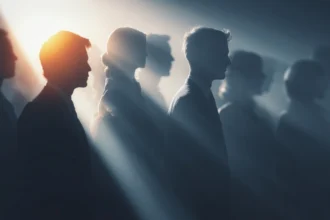HONG KONG—Unvaccinated residents will be barred from Hong Kong’s supermarkets and malls, as city officials try to beat back a record outbreak of Covid-19.
The restrictions unveiled Tuesday by Hong Kong Chief Executive Carrie Lam expand a vaccine mandate due to be implemented Feb. 24 that already covered venues like restaurants and gyms.
The financial hub is racing to contain a fast-growing outbreak driven by the highly transmissible Omicron variant of the coronavirus. Daily cases exceeded 600 for the second consecutive day Tuesday, with some transmission linked to gatherings over the Lunar New Year.
The numbers, while small in global terms, have rattled a city of 7.4 million that has largely kept the virus at bay throughout the pandemic with stringent border controls. Hong Kong has recorded a total of about 16,000 cases and 213 deaths since January 2020.
The city mandates government isolation and hospitalization for confirmed infections. Of the 1,668 Covid-19 cases in the hospital system as of Monday, three were considered serious or critical. Mrs. Lam said that those who needed more serious medical intervention were unvaccinated, underscoring the need for the shots to protect residents and the health system.

Hong Kong is pushing to have 90% of its residents vaccinated, up from the current 80.4%. A vaccination site in the city.
Photo: Liau Chung-ren/Zuma Press
The addition of supermarkets and shopping malls to the vaccine mandate was designed to force a surge in vaccination rates, Mrs. Lam said. Unvaccinated Hong Kong residents will have more limited options for buying food with supermarkets and restaurants off limits, and many of the city’s subway stations and residential blocks are linked to malls, making it necessary for residents to transit through them on the way home.
“These measures mean that it will be very inconvenient for someone who isn’t vaccinated,” Mrs. Lam said. “That is intentional. We are using the strongest measures we can to protect our city.”
The target is a vaccination rate of 90%, Mrs. Lam said, up from the current 80.4%.
Hong Kong’s vaccination rate has been especially low among the elderly, with about half of people over the age of 70 vaccinated. Mrs. Lam and health officials have said repeatedly that stringent controls had to remain in place to protect the lives of this vulnerable group, sparking frustration among vaccinated residents hoping for a break from the city’s strictures.
Children under 12 and people with a medical exemption will be excused from the mandate.
“Omicron is not going to wait for everyone to take their time and get vaccinated,” Mrs. Lam said. “Once people have gotten the jab, they can protect themselves but also the hospital system.”
Hong Kong has been under fire from business groups in recent months as countries around the world shift to living with Covid and opening up. Lengthy quarantines and flight bans that complicate getting in and out of the city, along with stringent social distancing rules imposed in January, are piling even more pressure on the city and driving more foreign workers to relocate.
Chinese officials have encouraged a tough stand to stamp out cases.
A Monday editorial in the People’s Daily, the Chinese Communist Party’s flagship newspaper, slammed critics of the “dynamic clearing” model and said that Hong Kong could never adopt a “lie flat” strategy of doing nothing by living with the virus, especially given Hong Kong’s high population density and limited medical resources.
“There are still more than one million citizens who haven’t received the first dose of the vaccine,” read the commentary. “If ‘clearing’ is abandoned for ‘lying flat,’ it’s foreseeable that the virus will spread rapidly on a large scale, causing serious damage to Hong Kong people’s livelihood and the city’s economic and social development.”
The current outbreak is linked to a returning traveler who is suspected to have caught Omicron toward the end of her then-mandatory 21-day hotel quarantine. The government lessened the requirement to two from three weeks last month, though many residents have reported extensive difficulties getting on flights amid Covid-related cancellations.
Vaccines are free in Hong Kong. The city offers a choice of the vaccine co-developed by BioNTech SE and Pfizer Inc. or CoronaVac from China’s Sinovac Biotech Ltd.
“This is a major step towards moving the economy forward,” said businessman Allan Zeman, an adviser to the government, whose company is landlord to many entertainment venues in the city. “Once we get to 90%, we can look at different ways of opening up.”
On Tuesday, Mrs. Lam also announced further measures in the coming two weeks to stem the virus, including closures of hair salons and religious venues, until at least the vaccine mandates come into place. She added that she would be seeking to amend labor laws so that being fired for missing work because of lockdowns or to get a mandatory test would be an “unreasonable dismissal,” while refusal to be vaccinated could be fair grounds for dismissal.
For the first time, the government also said there would be a temporary ban on gatherings of more than two households in a private premise. When asked about enforcement, the city’s permanent secretary for health, Thomas Chan, said that authorities wouldn’t be going door-to-door, but they could take legal action if people were found to have violated the rules during contact tracing.
Write to Natasha Khan at [email protected]
Copyright ©2022 Dow Jones & Company, Inc. All Rights Reserved. 87990cbe856818d5eddac44c7b1cdeb8








